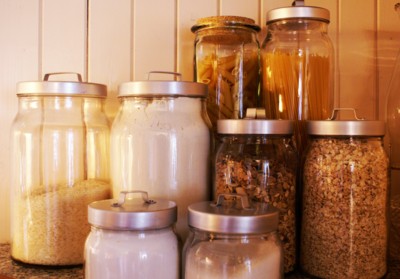
Those that are planning to store food for long-term emergencies know that certain foods do not always stand the test of time. Natural elements such as sunlight, moisture and oxygen can dramatically reduce the lifespan of some of our favorite foods. Therefore, re-packaging food in better quality food liners and eliminating any oxygen present in the package can extend the shelf life of most foods dramatically. When re-packaging foods, using a multi-barrier approach will keep these natural elements out of the container when sealed.
Having a guideline on hand of which foods last longer than others will ensure that your food supply stays within it’s expiration. According to the National Terror Alert website, the following foods can be stored for long-term use.
Guidelines for Food Storage:
Use within 6 months:
- Powdered milk (in box)
- Dried fruit (in metal container)
- Dry, crisp crackers (in metal container)
- Cereal
- Dried potatoes
- Flour
Use Within 1 year:
- Canned condensed meat and vegetable soups
- Canned fruit, fruit juices and vegetables
- Ready-to-eat cereals and uncooked instant cereals (in metal containers)
- Vitamins
- Peanut butter
- Jelly
- Hard candy and canned nuts
- Vegetable oil
May Be Stored Indefinitely (in proper containers and conditions):
- Wheat
- Dried Corn
- Sugar
- Honey
- Soybeans
- Instant coffee, tea and cocoa
- Salt
- Non carbonated soft drinks
- White rice
- Bouillon products
- Dry pasta
- Powdered milk (in nitrogen packed cans)

Thank you for this information. There is so much I don’t know, and this information answers a lot of question that I have had. Thank you and I am looking forward to the emails to get prepped.
nice
but need details: some can gds no expiry date
How do you store milled flour, cornmeal, rice, oatmeal, whole corn, seed for sprouts, so you will have no infestations?
If you vacuum seal is that good enough? Freeze for 2 weeks and vacuum seal?
Don’t want to fill a 6 gal bucket, want to seal in 3 or 5 lb packages and then put in bucket and store.
@ Diane,
The best way to store these types of food is with a multi-barrier approach. Milled flours will last 6 months – 12 months (depending on the storage method) and would be a good short-term food type. It is better to store wheat berries for long-term storage.
I’m not an expert on the shelf life of canned food, but I have talked with those who have qualification. They tell me that canned food can go for many years as long as the can is in good shape. I’ve eaten canned food 5 years and older and couldn’t tell the difference between newly canned soup and the one can at 5 years. Soup, canned meat, vegetables, and even fruit can still be usable after decades.
Check this link out http://grandpappy.info/hshelff.htm
I am looking for information on what is the best way to store food at home YOURSELF? I have a vacuum sealer, dehydrator,pressure canner and a freezer but whats best method for long term storage of wild game? Should I Dyhydrate it then vacuum seal it for the freezer or can it? Help Im Lost
Hi Alex,
You can dehydrate wild game to make jerky, use your pressure cooker to can it to make soups and stews or even freeze it. Using your vacuum sealer will keep the meal fresh and inhibit any microbial growth. In the freezer the vacuum sealer bags will reduce freezer burn too.
If you decide to dehydrate it, use your vacuum sealer to prolong the freshness.
Thanks,
Tess
Susan,
I prefer to rotate my canned goods every 6 months to ensure that the food in my pantry is all within the food’s expiration. Now that I said that, I should also explain that even though the cans of food have gone past their expiration doesn’t mean it’s not edible. It only means that the food company’s guaranteed the freshness of that product up to that specific date. The date is usually 2-5 years from the manufacture date.
Here are some signs of spoiled food to look for:
color changes
cloudiness in liquid
soft food texture
crystals growing on top of food
strange appearance or texture
off smell
Many have found canned goods dating back multiple decades and the food is still edible because the environment of the food is still sterile. Also, high acid foods usually have a shorter shelf life compared to low acid foods. For emergency storage, commercially canned foods in metal or jars will remain safe to consume as long as the seal has not been broken. However, the quality of the food may be an issue.